ISLAMABAD: Prime Minister Imran Khan’s media adviser on Sunday praised the “magnanimous” gesture of Saudi Crown Prince Mohammed bin Salman who stopped the Pakistani premier from using a commercial airliner to fly to the United States and arranged a special plane for him to go to New York.
“This happens in bilateral relations,” Iftikhar Durrani told Arab News. “Prime Minister Imran Khan went to Saudi Arabia on a commercial flight. It was the magnanimity of Saudi Crown Prince Muhammad bin Salman that he offered a special plane to him for his travel from Saudi Arabia to the United States.”
Durrani added that both leaders were charismatic and liked each other.
“There is a lot in common between the prime minister and the Saudi crown prince,” he continued. “When the Saudi leader visited Islamabad, he said that the Kingdom wanted to work with Pakistan for a while but was waiting for such leadership. So they have a chemistry. They like each other.”
The prime minister’s adviser maintained that Pakistan was respected in the Muslim world and Khan was widely viewed as a statesman.
“This offer of special plan was a good gesture,” he said. “You should also keep in mind that the crown prince is from the royal family and thinks like a king. So he offered the special plane to his guest who arrived on a commercial flight.”
The prime minister arrived in New York on Saturday to participate in the 74th session of United Nations General Assembly where he hopes to bring international attention to the situation in Indian-administered Kashmir after New Delhi’s decision last month to revoke the limited constitutional autonomy for the disputed Himalayan region.
Durrani informed that the PM would take a commercial flight while returning home since “he is always concerned about public money.”
PM Khan reaches US on crown prince's special plane
PM Khan reaches US on crown prince's special plane
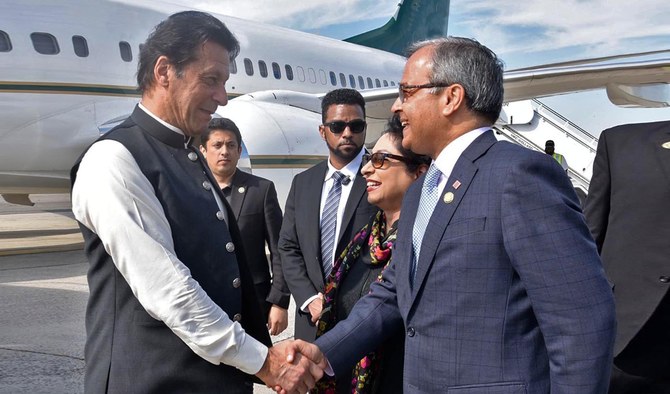
- Khan’s media adviser praises the crown prince for his 'magnanimous' gesture
- Says the country is respected in the Muslim world and Khan is viewed as a statesman
Pakistani PM to attend Islamic Summit Conference in Gambia on May 4
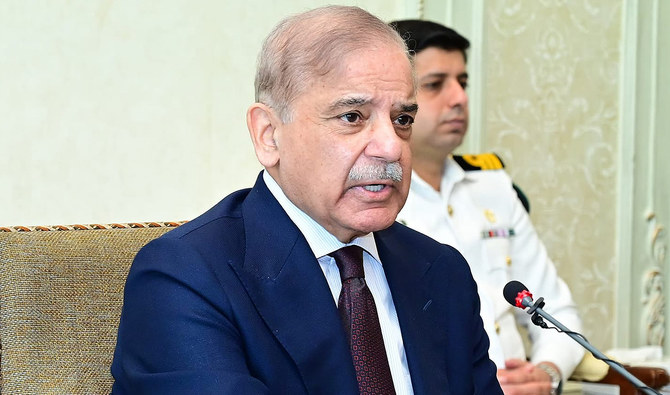
- Palestine, Islamophobia, climate change on agenda of meeting arranged by OIC
- Summit to be attended by concerned heads of state such as PMs, presidents, emirs
ISLAMABAD: Pakistani Prime Minister Shehbaz Sharif will attend the 15th session of the Islamic Summit Conference organized by the OIC on May 4-5 in the Gambian capital of Banjul to discuss a variety of regional and global issues, including Palestine, Islamophobia, climate change and the status of minorities, state-run APP reported.
The session will be held under the slogan “Enhancing Unity and Solidarity through Dialogue for Sustainable Development,” according to a press release issued by the OIC General Secretariat.
The Islamic Summit Conference attended by Sharif will be preceded by a preparatory meeting of senior officials on April 30 and May 1, who will discuss the documents of the session and submit a report to a preparatory meeting of the Council of Foreign Ministers (CFM).
“The preparatory CFM meeting will be held on May 1-2 to consider the results of the senior officials meeting and in turn, submit its report to the Summit,” the OIC said.
Pakistani foreign minister Ishaq Dar will attend the CFM meeting.
“Leaders of the member states will discuss the political issues of the Islamic world, most notably the Palestinian cause, and the economic, humanitarian, social and cultural issues, in addition to the issues of youth, women, family, science and technology, information, Muslim communities and minorities in non-OIC member states, and legal matters,” the OIC said.
The Summit will also tackle issues related to hate speech and Islamophobia, the promotion of dialogue, climate change and food security.
“The 15th session will issue a final communique that includes the OIC positions on the issues submitted to the Summit, a resolution on Palestine and Al-Quds Al-Sharif, and the Banjul Declaration,” the OIC added.
The Islamic Summit is a principal organ of the OIC focused on the formulation, development, and implementation of decisions made by 57 member states. The Summit is attended by concerned heads of state such as prime ministers, presidents, emirs and other equivalent heads.
Wave of pro-Palestinian campus protests in US meets forceful response
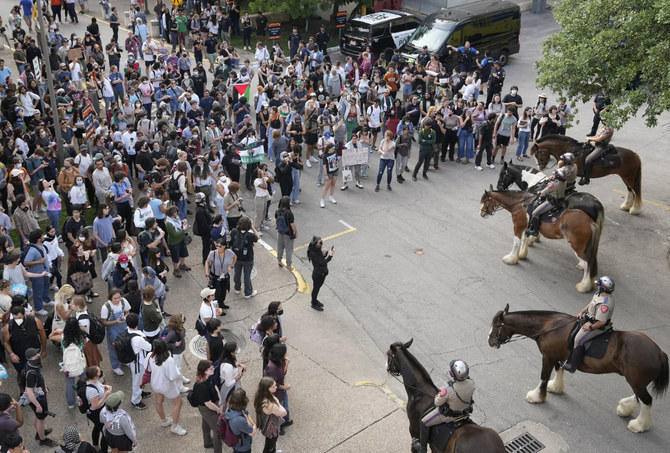
- Fresh clashes between police and students opposed to Israel’s war in Gaza broke out on Thursday
- Questions abound over forceful methods being used to shut down intensifying protests
NEW YORK: Fresh clashes between police and students opposed to Israel’s war in Gaza broke out on Thursday, raising questions about forceful methods being used to shut down protests that have intensified since mass arrests at Columbia University last week.
Over the past two days, law enforcement at the behest of college administrators have deployed Tasers and tear gas against students protesters at Atlanta’s Emory University, activists say, while officers clad in riot gear and mounted on horseback have swept away demonstrations at the University of Texas in Austin.
At Columbia, the epicenter of the US protest movement, university officials are locked in a stalemate with students over the removal of a tent encampment set up two weeks ago as a protest against the Israeli offensive.
The administration, which has already allowed an initial deadline for an agreement with students to lapse, has given protesters until Friday to strike a deal.
Other universities appear determined to prevent similar, long-running demonstrations to take root, opting to work with police to shut them down quickly and in some cases, with force.
Overall, more than 530 arrests have been made in the last week across major US universities in relation to protests over Gaza, according to a Reuters tally. University authorities have said the demonstrations are often unauthorized and called on police to clear them.
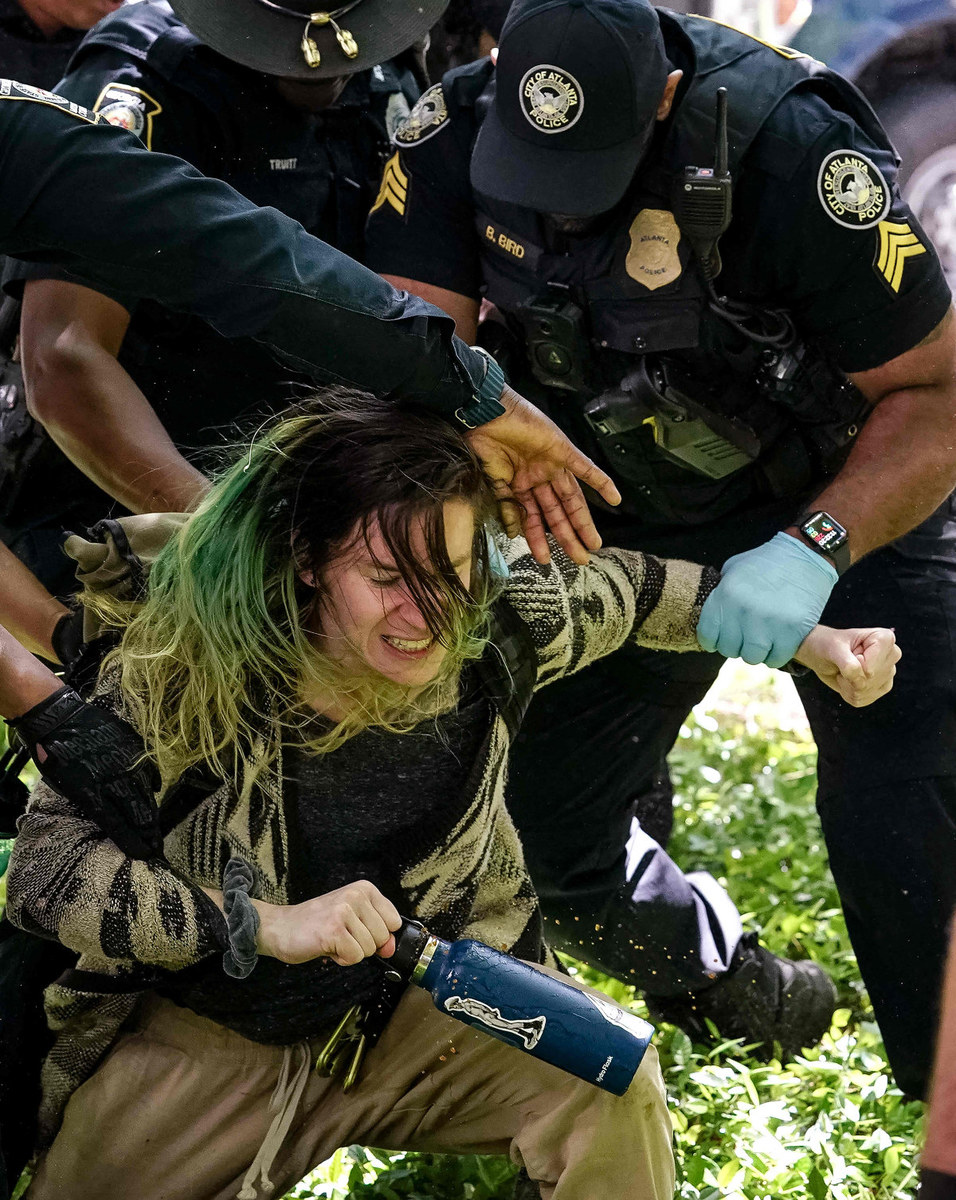
At Emory, police detained at least 15 people on its Atlanta campus, according to local media, after protesters began erecting a tent encampment in an attempt to emulate a symbol of vigilance employed by protesters at Columbia and elsewhere.
The local chapter of the activist group Jewish Voice for Peace said officers used tear gas and Tasers to dispense the demonstration and take some protesters into custody.
Video footage aired on FOX 5 Atlanta showed a melee breaking out between officers and some protesters, with officers using what appeared to be a stun gun to subdue a person and others wrestling other protesters to the ground and leading them away.
“Several dozen protesters trespassed into Emory University’s campus early Thursday morning and set up tents,” the school wrote in response to an emailed request for comment. It described the protesters as “activists attempting to disrupt our university,” but did not comment directly on the reports of violence.
Atlanta police did not immediately respond to inquiries about the number of protesters who were detained or about reports over the use of tear gas and stun guns.
Similar scenarios unfolded on the New Jersey campus of Princeton University where officers swarmed a newly-formed encampment, video footage on social media showed.
Boston police earlier forcibly removed a pro-Palestinian encampment set up by Emerson College, arresting more than 100 people, media accounts and police said. The latest clashes came a day after police in riot gear and on horseback descended on hundreds of student protesters at the University of Texas at Austin and arrested dozens of them.
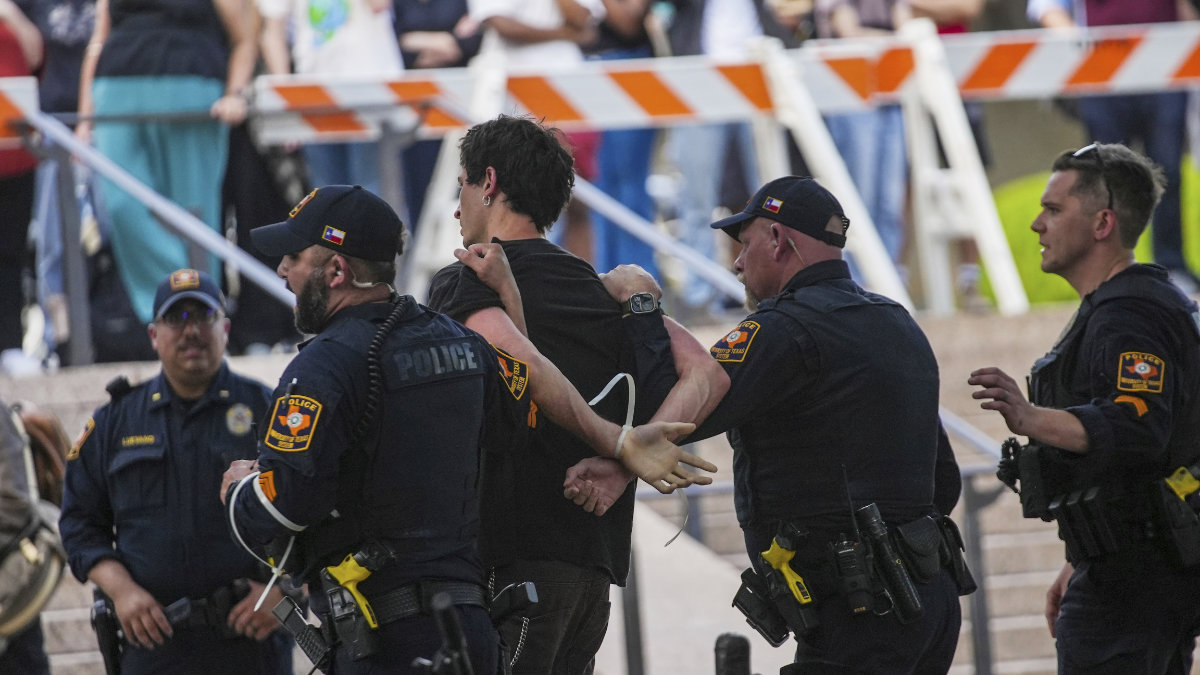
But prosecutors on Thursday dropped charges against most of the 60 people taken into custody, mostly on misdemeanor charges of criminal trespassing and disorderly conduct, and said they would proceed with only 14 of those cases.
In dropping the charges, the Travis County district attorney cited “deficiencies in the probable cause affidavits.”
‘Alarming reports’
Human Rights Watch and the American Civil Liberties Union have condemned the arrest of protesters and urged authorities to respect their free speech rights.
But some Republicans in Congress have accused university administrators of allowing Jewish students to be harassed, putting increasing pressure on schools to tightly control any demonstrations and to block any semi-permanent encampment.
US Education Secretary Miguel Cardona on Thursday said his department was closely monitoring the protests, including what he called “very alarming reports of antisemitism.”
In response, activist groups have strongly denied that the protests are antisemitic. Their aim is to pressure universities from divesting from companies that contribute to the Israeli military actions in Gaza, they say.
Even so, protest leaders have acknowledged that hateful rhetoric has been directed at Jewish students, but insist that people who tried to infiltrate and malign their movement are responsible for any harassment.

Friday deadline at Columbia
At Columbia, officials have given protesters until 4 a.m. on Friday to reach an agreement with the university on dismantling dozens of tents set up on the New York City campus in a protest that started a week ago.
An initial deadline of midnight Tuesday came and went without an agreement, but administrators extended it for 48 hours, citing progress in the talks.
The university already tried to shut the protest down by force. On April 18, Columbia President Minouche Shafik took the unusual move of asking police to enter the campus, drawing the ire of many rights groups, students and faculty.
More than 100 people were arrested and the tents were removed from the main lawn. But within a few days, the encampment was back in place, and the university’s options appeared to narrow.
Protesters have vowed to keep the protests going until their universities agree to disclose and divest any financial holdings that might support the war in Gaza, and grant amnesty to students suspended from school during the demonstrations.
Student protesters have also demanded that the US government rein in Israeli strikes on civilians in Gaza, which have killed more than 34,000 people, according to Palestinian health authorities. Israel is retaliating against an Oct. 7 Hamas attack that killed 1,200 people and led to 253 taken hostage, according to Israeli tallies.
India begins voting in second phase of election as Modi vs Gandhi campaign heats up
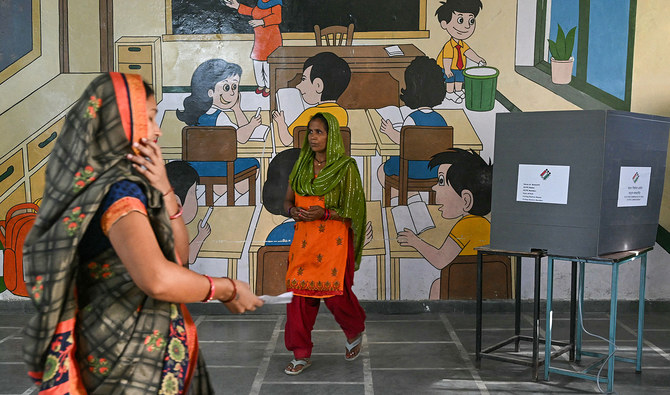
- Almost one billion people eligible to vote in seven-phase general elections that began on April 19 and concludes on June 1
- Modi is seeking record third straight term on the back of economic record, welfare measures, Hindu nationalism
BENGALURU/KOTTAYAM/MATHURA: India began voting on Friday in the second phase of the world’s biggest election, as Prime Minister Narendra Modi and his rivals raise the pitch of the campaign by focusing on hot-button issues such as religious discrimination, affirmative action and taxes.
Almost one billion people are eligible to vote in the seven-phase general elections that began on April 19 and concludes on June 1, with votes set to be counted on June 4.
Modi is seeking a record-equalling third straight term on the back of his economic record, welfare measures, national pride, Hindu nationalism and personal popularity. Surveys suggest he will easily win a comfortable majority.
His challengers have formed an alliance of more than two dozen parties and are promising greater affirmative action, more handouts and an end to what they call Modi’s autocratic rule.
Friday’s polling will be held for 88 of the total 543 seats in the lower house of parliament with 160 million people eligible to vote. It will be spread across 13 states and federal territories in the world’s most populous country.
More than half of those 88 seats are in the southern states of Kerala and Karnataka and the northwestern state of Rajasthan.
The campaign has changed tack since the first phase and become heated as Modi and the main opposition Congress party have faced off on communal issues with Modi accusing Congress of favoring minority Muslims, aiming to dilute affirmative action and planning to impose inheritance tax.
“Congress, which used to make noise in the name of the Constitution, has now been badly exposed for its hidden agenda,” Modi posted on X late on Thursday.
Congress has denied the charges and said Modi is distracting voters from real issues such as unemployment, price rise and rural distress and fears losing.
RAHUL GANDHI IN THE FRAY
“We spoke to you, we heard what was on your mind and drafted a revolutionary manifesto,” Congress leader Rahul Gandhi said in a video message on the eve of the vote. “This has been drafted by the Congress party but it is your voice.”
Gandhi, former Congress president and the face of the party, is among the 1200 candidates in the fray on Friday.
He is seeking re-election from Wayanad in Kerala and faces Annie Raja of the Communist Party of India (CPI) and BJP’s K. Surendran, among others, in the Left Front-ruled state.
In 2019, Gandhi defeated the CPI candidate by more than 400,000 votes, the highest margin in Kerala, although he lost his second seat to BJP in the family bastion of Amethi in north India. India allows a candidate to contest from more than one seat but they can retain only one if they win from more.
Congress slumped to a historic low when it was swept out of power by BJP in 2014 and won its second-lowest number of 52 seats in 2019, with Kerala contributing the highest of 15.
The party is also expected to do better in Karnataka where it won just one of 28 seats in 2019 but gained strength and defeated BJP in state elections last year.
It is still seen to be struggling nationally as bickering within the opposition alliance it leads and graft cases against some leaders has hobbled its challenge to Modi.
The Election Commission and political parties have been worried about voter turnout due to the summer heat and wedding season in some parts of the country with turnout falling to around 65 percent in the first phase from nearly 70 percent in 2019.
The poll panel has increased appeals for voter participation since, asking them to “vote with responsibility and pride.”
Hit repeatedly by floods in northwest Pakistan, 70-year-old to rebuild house for 10th time
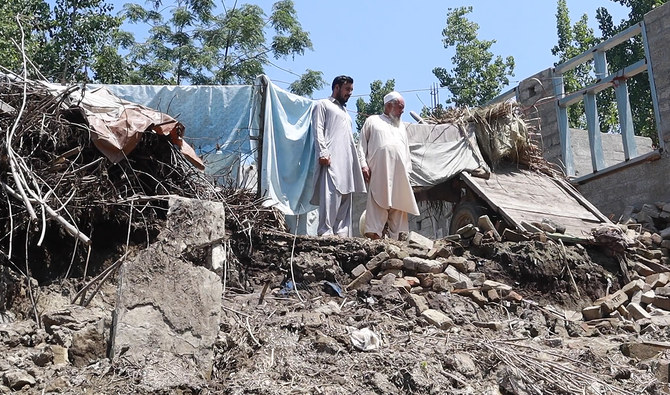
- Mian Awal Khan lives in Charsadda district, prone to floods after heavy rains
- 65 killed, 80 injured in heavy rains in Khyber Pakhtunkhwa province since Apr. 12
CHARSADDA, Pakistan: Mian Awal Khan stared at the remains of his house, destroyed by flooding in the River Khyali earlier this month, and cried quietly into his sleeve.
This is the 10th time the 70-year-old would have to rebuild his house in Charsadda, a district in Pakistan’s northwestern Khyber Pakhtunkhwa province prone to floods after heavy rains.
At least 65 people have been killed and 80 injured in downpours and subsequent flooding in KP since Apr. 12. Charsadda district is one of the worst hit, with three rivers, Jindi, Khyali and Kabul, meeting downstream at the Shahbara village.
Unfortunately for Khan, his house initially stood on the banks of the River Kyali and was first washed away by floods in 2010. He built a new house 500 meters away from that spot after the river carved out a path for itself on his land.
Flooding would destroy his house many times again.
“This will be the tenth time I will rebuild my house,” an emotional Khan told Arab News, seated on the concrete remains of his three-room house.
“My house was washed away by the floods six times when it was over there [initial spot] and four times when it was here.”
Khan’s 35-year-old son, Mian Fawadullah, said the family was unable to save any belongings on the day of the flooding.
“When we were busy rescuing our children and women, this [destruction] happened to our house,” he told Arab News. “We didn’t take any household items as our life was in danger. We left everything just as it was in its place.”
The flood had cost the family Rs1.5-1.6 million [$5,385-$5,744], Fawadullah said, and also destroyed 108,900 square feet of fields as well as washed away livestock and filled the fields with mud at a critical time for farming.
“Farming has also vanished now,” he lamented. “The wheat and the sugarcane have rotten in the water. This is a real mess. We do labor, prepare the field and the river washes it away [every single time].”
“EATEN MY YOUTH”
Flood survivors say they want the government to build protection walls and put in place preventative mechanisms in a country consistently ranked among the most affected by climate change impacts.
Unprecedented rains in 2022 triggered flash floods that killed over 1,700 people and caused damages worth $33 million.
Ihsan Dawar, a public relations officer at the KP Provincial Disaster Management Authority, said the government was carrying out relief works, particularly to rebuild around 3,500 houses partially or fully damaged in the recent floods.
“Up until this time, about Rs200 million [$718,096] have been distributed among the victims of the fresh spell of rain incidents,” Dawar told Arab News.
But Khan has little hope floods won’t wreak havoc on his life again.
“The river is not going to spare it [my house] here also,” he said, adding that it was cutting at the edges of the land like a “butcher cutting meat.”
When asked what he would do now, he broke down and cried quietly.
“This is too difficult,” he said about having to rebuild his house yet again. “It has eaten all my youth.”
He was ‘joyous’ to be in Australia, says family of Pakistani guard killed in Sydney attack
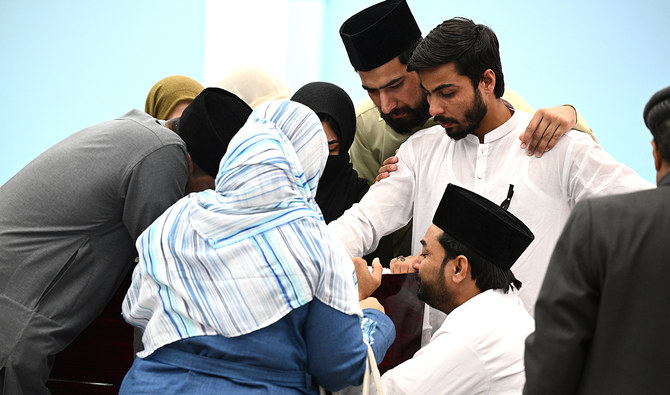
- Faraz Tahir, 30, was the only male killed in fatal Sydney knife attack on April 13
- Tahir’s was working his first day shift when Bondi Junction stabbing took place
ISLAMABAD: The family of Faraz Tahir, a 30-year-old Pakistani security guard killed in a deadly shopping center knife attack in Syndney this month, said he had been “joyous” about making a new life for himself as a refugee in Australia.
Six people were killed and 12 hurt when 40-year-old Joel Cauchi stabbed citizens at the Westfield Bondi Junction on April 13 in one of the city’s worst violent crimes in recent years. Among the dead were five women and Tahir, a refugee from Pakistan who worked as a security guard at the ball.
Police have said the man who fatally stabbed the six people seemed to have targeted women, as the attacker’s family has opened up about Cauchi’s long history of mental illness and frustrations with women.
Mass killings are rare in the country of about 27 million people, which has some of the world’s toughest gun and knife laws.
Speaking to the media, Tahir’s brother Mudasar Bashir said the day he was killed was the first time he was working the day shift.
“We are very proud of him because Islam, our religion, says that if you save even one human, you save all of humanity,” Bashir said.
“So he saved, I don’t know how many people he saved in that time. I think there are lots of people.”
He said Tahir was happy to have moved to Australia from Pakistan.
“He was very happy, he was joyous,” Bashir said. “So, every time he was saying that ‘I am happy here, it’s a very good place. At least I can pray, I can go to my mosque’.”
Bashir last spoke to his brother the night before the attack.
“Night [before the attack] we spoke and he said that ‘I have a job, let me sleep, it’s nighttime’,” Tahir’s brother said. “I said, ‘Okay don’t worry, sleep. We’ll talk tomorrow.’ And it was the last time we spoke with him.”
With inputs from Reuters










